Hot Water Circulation Pump Market
Hot Water Circulation Pump Market Size and Share Forecast Outlook 2025 to 2035
Hot water circulation pump market is projected to grow from USD 3,600.0 million in 2025 to USD 5,000.0 million by 2035, at a CAGR of 3.3%. Single-Stage will dominate with a 70.0% market share, while residential will lead the end use segment with a 50.0% share.
Hot Water Circulation Pump Market Forecast and Outlook 2025 to 2035
The hot water circulation pump market stands at the threshold of a decade-long expansion trajectory that promises to reshape heating system technology and thermal management solutions. The market's journey from USD 3,600.0 million in 2025 to USD 5,000.0 million by 2035 represents substantial growth, the market will rise at a CAGR of 3.3% which demonstrating the accelerating adoption of advanced circulation pump technology and heating optimization across residential facilities, commercial buildings, and industrial heating sectors.
The first half of the decade (2025-2030) will witness the market climbing from USD 3,600.0 million to approximately USD 4,230.0 million, adding USD 630.0 million in value, which constitutes 45% of the total forecast growth period. This phase will be characterized by the rapid adoption of single-stage circulation pump systems, driven by increasing residential heating demands and the growing need for advanced thermal management solutions worldwide. Enhanced pumping capabilities and automated circulation control systems will become standard expectations rather than premium options.
The latter half (2030-2035) will witness continued growth from USD 4,230.0 million to USD 5,000.0 million, representing an addition of USD 770.0 million or 55% of the decade's expansion. This period will be defined by mass market penetration of multi-stage pumping technologies, integration with comprehensive building management platforms, and seamless compatibility with existing heating infrastructure. The market trajectory signals fundamental shifts in how heating facilities approach circulation management and energy efficiency, with participants positioned to benefit from growing demand across multiple pump types and application segments.
Quick Stats for Hot Water Circulation Pump Market
- Hot Water Circulation Pump Market Value (2025): USD 3,600.0 million
- Hot Water Circulation Pump Market Forecast Value (2035): USD 5,000.0 million
- Hot Water Circulation Pump Market Forecast CAGR: 3.3%
- Leading Type in Hot Water Circulation Pump Market: Single-Stage
- Key Growth Regions in Hot Water Circulation Pump Market: East Asia, Europe, and South Asia Pacific
- Top Players in Hot Water Circulation Pump Market: Grundfos, Wilo, Xylem, KSB, Armstrong Fluid
- Where revenue comes from - Now Vs Next (Industry-level view)
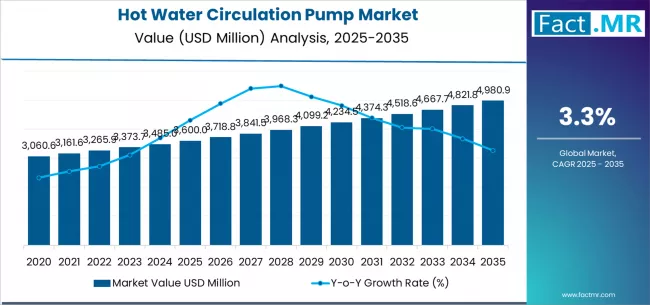
| Period | Primary Revenue Buckets | Share | Notes |
|---|---|---|---|
| Today | Single-stage residential systems | 35% | Volume-driven, standard heating applications |
| Multi-stage commercial solutions | 18% | Commercial focus, enhanced performance | |
| Electric drive systems | 45% | Conventional power, broad deployment | |
| Solar-powered units | 2% | Emerging technology, niche applications | |
| Future (3-5 yrs) | Advanced single-stage systems | 32-35% | Technology enhancement, efficiency gains |
| Multi-stage commercial innovations | 20-25% | Commercial differentiation, capacity expansion | |
| Smart electric drive solutions | 40-44% | IoT integration, energy optimization | |
| Solar and hybrid systems | 6-10% | Renewable energy applications, grid independence | |
| Industrial heating solutions | 8-12% | Process heating, specialized applications | |
| Digital monitoring and control | 3-6% | System optimization, predictive maintenance |
Hot Water Circulation Pump Market Key Takeaways
At-a-Glance Metrics
| Metric | Value |
|---|---|
| Market Value (2025) → | USD 3,600.0 million |
| Market Forecast (2035) ↑ | USD 5,000.0 million |
| Growth Rate ★ | 3.3% CAGR |
| Leading Type → | Single-Stage |
| Primary Application → | Residential Segment |
The market demonstrates strong fundamentals with single-stage circulation pump systems capturing a dominant share through advanced pumping capabilities and residential heating optimization. Residential applications drive primary demand, supported by increasing circulation requirements and heating capacity development. Geographic expansion remains concentrated in developed markets with established heating infrastructure, while emerging economies show accelerating adoption rates driven by construction initiatives and rising comfort standards.
Imperatives for Stakeholders in Hot Water Circulation Pump Market
Design for application versatility, not just pumping capacity
- Offer heating development packages: circulation equipment + system testing + documentation + trained technicians + technical support.
- Preconfigured workflows: heating protocols, system changeover procedures, maintenance records, and digital monitoring on circulation runs.
Pumping technology readiness
- Real-time flow monitoring analytics, predictive maintenance capabilities, and smart building integration (BMS connectivity, system tracking capabilities).
Efficiency-by-design approach
- Automated flow control systems, real-time efficiency mechanisms, energy management integration, and paperless system documentation.
Value-based pricing models
- Clear base pumping price + transparent service tiers (application support, capacity availability, performance guarantees); subscriptions for digital services and analytics.
Segmental Analysis
Primary Classification: The market segments by type into single-stage and multi-stage circulation pump variants, representing the evolution from basic pumping methods to specialized circulation solutions for comprehensive residential and commercial heating optimization.
Secondary Classification: End-use segmentation divides the market into residential (50%), commercial (35%), and industrial (15%) sectors, reflecting distinct requirements for circulation performance, operational efficiency, and facility heating standards.
Tertiary Classification: Drive type segmentation covers electric (90%) and solar (10%) power solutions, demonstrating the market's current reliance on conventional power sources while showing emerging renewable energy adoption.
Regional Classification: Geographic distribution covers major regions with East Asia leading adoption while Europe and South Asia Pacific show strong market presence driven by heating modernization programs.
The segmentation structure reveals technology progression from standard pumping methods toward specialized circulation systems with enhanced heating consistency and energy efficiency capabilities, while application diversity spans from residential heating facilities to industrial operations requiring precise thermal management solutions.
By Type, the Single-Stage Segment Accounts for Dominant Market Share
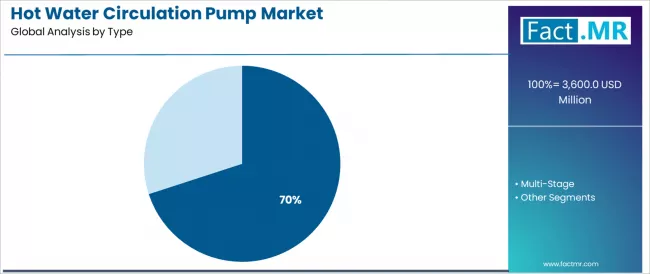
Market Position: Single-Stage circulation pump systems command the leading position in the market with 70% market share through advanced pumping features, including superior flow characteristics, operational efficiency, and residential heating optimization that enable heating facilities to achieve optimal circulation across diverse residential and light commercial applications.
Value Drivers: The segment benefits from heating facility preference for reliable circulation systems that provide consistent flow performance, reduced pumping complexity, and operational efficiency optimization without requiring significant infrastructure modifications. Advanced design features enable automated flow control systems, temperature consistency, and integration with existing heating equipment, where operational performance and energy efficiency represent critical facility requirements.
Competitive Advantages: Single-Stage circulation pump systems differentiate through proven operational reliability, consistent flow characteristics, and integration with automated heating systems that enhance facility effectiveness while maintaining optimal circulation standards for diverse residential and commercial applications.
Key market characteristics:
- Advanced pumping designs with optimized flow configuration and operational efficiency capabilities
- Enhanced circulation effectiveness, enabling 85-90% energy efficiency with reliable flow performance
- Residential heating compatibility, including automated control systems, monitoring integration, and system optimization for circulation management
Multi-Stage Systems Show Commercial Market Growth
Multi-Stage circulation pump systems maintain a 30% market position in the market due to their enhanced pumping capabilities and commercial application characteristics. These systems appeal to facilities requiring high-performance circulation with premium positioning for commercial heating applications. Market growth is driven by commercial segment expansion, emphasizing advanced circulation solutions and operational efficiency through optimized multi-stage designs.
By End-Use, the Residential Segment Shows Market Leadership
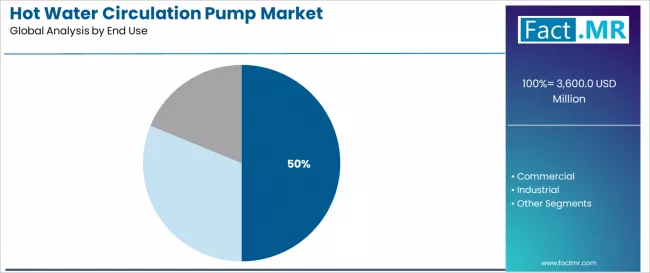
Market Context: Residential applications demonstrate market leadership in the market with 50% share due to widespread adoption of circulation systems and increasing focus on home heating optimization, energy cost efficiency, and residential comfort applications that maximize heating effectiveness while maintaining energy standards.
Appeal Factors: Residential operators prioritize circulation consistency, energy efficiency, and integration with existing home heating infrastructure that enables coordinated circulation operations across multiple heating zones. The segment benefits from substantial residential construction investment and modernization programs that emphasize the acquisition of advanced circulation systems for home heating optimization and energy efficiency applications.
Growth Drivers: Residential construction programs incorporate circulation pumps as standard components for heating operations, while home renovation growth increases demand for efficient circulation capabilities that comply with energy standards and minimize operational complexity.
Application dynamics include:
- Strong growth in residential construction and home renovation requiring advanced circulation capabilities
- Increasing adoption in heating optimization and energy efficiency applications for homeowners
- Rising integration with smart heating systems for operational optimization and energy management
Commercial Applications Maintain Strong Demand
Commercial applications capture 35% market share through comprehensive heating requirements in office buildings, retail facilities, and institutional buildings. These facilities demand reliable circulation systems capable of operating with diverse heating loads while providing effective thermal distribution and operational performance capabilities.
Industrial Applications Show Specialized Growth
Industrial applications account for 15% market share, including process heating systems, manufacturing facilities, and industrial operations requiring efficient circulation solutions for thermal management and process optimization.
By Drive Type, Electric Systems Dominate Market Share
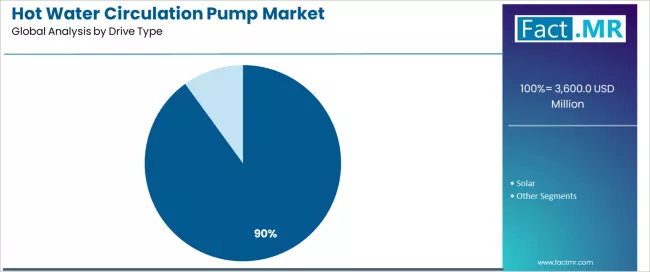
Electric drive systems maintain 90% market dominance through established power infrastructure compatibility and proven operational reliability. These systems benefit from widespread electrical grid availability and mature technology development that ensures consistent performance across residential and commercial applications.
Solar Drive Systems Show Emerging Growth
Solar-powered circulation systems capture 10% market share, representing emerging renewable energy adoption in circulation applications. Growth is driven by energy independence initiatives and environmental considerations, particularly in remote locations and grid-independent installations.
What are the Drivers, Restraints, and Key Trends of the Hot Water Circulation Pump Market?
| Category | Factor | Impact | Why It Matters |
|---|---|---|---|
| Driver | Residential construction expansion & heating modernization (comfort trends, energy efficiency focus) | ★★★★★ | Large-scale residential construction requires efficient, standardized circulation solutions with consistent performance and energy efficiency across heating applications. |
| Driver | Commercial building development & energy management systems | ★★★★★ | Drives demand for advanced circulation solutions and smart building integration; suppliers providing building automation gain competitive advantage. |
| Driver | Energy efficiency requirements & building code compliance | ★★★★☆ | Building owners need energy-efficient circulation solutions; demand for high-efficiency pump formats expanding addressable market segments. |
| Restraint | Energy cost fluctuations & operational expense concerns | ★★★★☆ | Small facility operators face cost pressure; increases price sensitivity and affects system adoption in cost-conscious segments. |
| Restraint | Installation complexity & system integration requirements | ★★★☆☆ | Heating system applications face challenges with installation adaptation and technical requirements, limiting adoption in retrofit segments. |
| Trend | Smart building integration & IoT connectivity | ★★★★★ | Growing demand for connected circulation systems; digital integration becomes core value proposition in modern building segments. |
| Trend | Renewable energy adoption & solar-powered systems | ★★★★☆ | Regional energy independence drives demand for solar circulation solutions; renewable integration capabilities drive competition toward green technology. |
Analysis of the Hot Water Circulation Pump Market by Key Country
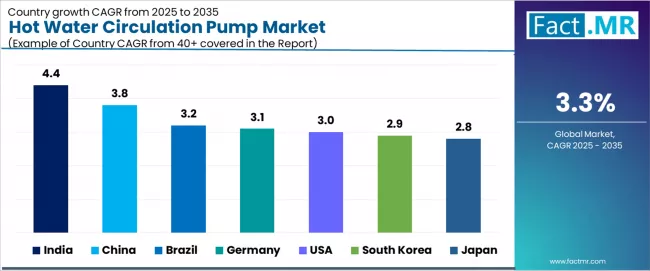
The market demonstrates varied regional dynamics with growth leaders including India (4.4% growth rate) and China (3.8% growth rate) driving expansion through construction initiatives and heating capacity development. Steady Performers encompass Brazil (3.2% growth rate), Germany (3.1% growth rate), and United States (3.0% growth rate), benefiting from established heating industries and advanced technology adoption. Mature Markets feature South Korea (2.9% growth rate) and Japan (2.8% growth rate), where heating technology advancement and energy efficiency requirements support consistent growth patterns.
Regional synthesis reveals South Asian and East Asian markets leading adoption through construction expansion and heating development, while Western countries maintain steady expansion supported by technology advancement and regulatory energy efficiency requirements. Emerging markets show strong growth driven by residential applications and heating modernization trends.
| Region/Country | 2025-2035 Growth | How to win | What to watch out |
|---|---|---|---|
| India | 4.4% | Focus on cost-effective heating solutions | Infrastructure challenges; energy grid reliability |
| China | 3.8% | Lead with high-capacity circulation systems | Environmental regulations; installation complexity |
| Brazil | 3.2% | Value-oriented heating models | Economic fluctuations; import dependencies |
| Germany | 3.1% | Offer premium efficiency systems | Over-engineering; energy regulations |
| South Korea | 2.9% | Push smart building solutions | Market saturation; technology costs |
| United States | 3.0% | Provide energy-efficient applications | Building code compliance; installation requirements |
| Japan | 2.8% | Premium quality positioning | System precision; market maturity |
India Drives Fastest Market Growth
India establishes fastest market growth through aggressive residential construction programs and comprehensive heating capacity development, integrating advanced hot water circulation pumps as standard components in residential buildings and commercial facility installations. The country's 4.4% growth rate reflects government initiatives promoting building modernization and energy efficiency capabilities that mandate the use of advanced circulation systems in heating facilities. Growth concentrates in major urban centers, including Delhi, Mumbai, and Bangalore, where construction technology development showcases integrated circulation systems that appeal to builders seeking advanced heating optimization capabilities and energy management applications.
Indian manufacturers are developing cost-effective circulation solutions that combine domestic manufacturing advantages with advanced operational features, including automated flow control systems and enhanced efficiency capabilities. Distribution channels through heating equipment suppliers and construction service distributors expand market access, while government support for energy efficiency development supports adoption across diverse building segments.
Strategic Market Indicators:
- Residential construction facilities leading adoption with 68% deployment rate in heating systems and building development sectors
- Government energy efficiency programs providing substantial funding for domestic heating technology development
- Local heating equipment manufacturers capturing 42% market share through competitive pricing and localized installation support
- Export market development for cost-effective circulation solutions targeting emerging construction markets
China Emerges as High-Capacity Market
In Beijing, Shanghai, and Guangzhou provinces, heating facilities and commercial buildings are implementing advanced hot water circulation pumps as standard equipment for heating optimization and building system enhancement, driven by increasing government building investment and construction modernization programs that emphasize the importance of circulation capabilities. The market holds a 3.8% growth rate, supported by government construction initiatives and building infrastructure development programs that promote advanced circulation systems for commercial facilities. Chinese operators are adopting circulation systems that provide consistent operational performance and energy compliance features, particularly appealing in urban regions where heating efficiency and building standards represent critical operational requirements.
Market expansion benefits from growing commercial construction capabilities and building integration agreements that enable domestic production of advanced circulation systems for building applications. Technology adoption follows patterns established in HVAC equipment, where efficiency and performance drive procurement decisions and operational deployment.
Brazil Shows Strong Regional Leadership
Brazil's market expansion benefits from diverse residential construction demand, including building modernization in São Paulo and Rio de Janeiro, heating facility upgrades, and government construction programs that increasingly incorporate circulation solutions for heating optimization applications. The country maintains a 3.2% growth rate, driven by rising residential construction activity and increasing recognition of circulation pump benefits, including enhanced heating performance and improved energy efficiency.
Market dynamics focus on cost-effective circulation solutions that balance advanced operational performance with affordability considerations important to Brazilian builders. Growing residential development creates continued demand for modern circulation systems in new building infrastructure and heating modernization projects.
Germany Shows Technology Leadership
Germany's advanced heating technology market demonstrates sophisticated hot water circulation pump deployment with documented operational effectiveness in commercial buildings and residential facilities through integration with existing energy systems and building infrastructure. The country leverages engineering expertise in heating technology and energy systems integration to maintain a 3.1% growth rate. Industrial centers, including North Rhine-Westphalia, Bavaria, and Baden-Württemberg, showcase premium installations where circulation systems integrate with comprehensive building platforms and facility management systems to optimize heating operations and energy effectiveness.
German manufacturers prioritize system efficiency and EU energy compliance in heating equipment development, creating demand for premium systems with advanced features, including building monitoring integration and automated energy systems. The market benefits from established heating technology infrastructure and willingness to invest in advanced circulation technologies that provide long-term operational benefits and compliance with international energy standards.
South Korea Shows Smart Building Development
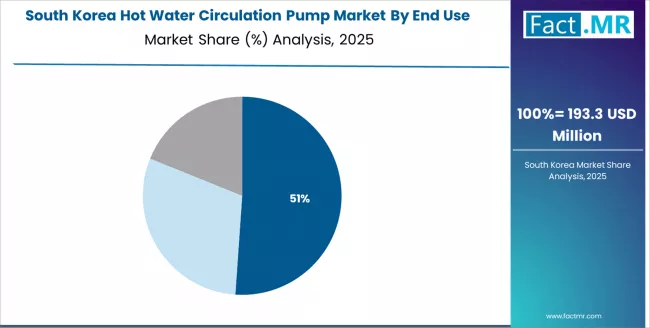
South Korea establishes smart building development through comprehensive heating modernization and technology integration, integrating hot water circulation systems across residential buildings and commercial facility applications. The country's 2.9% growth rate reflects growing building investment and increasing adoption of smart circulation systems that support expanding use of building automation in Korean facilities. Growth concentrates in major urban areas, including Seoul metropolitan area, Busan, and Incheon, where building technology development showcases integrated circulation systems that appeal to Korean builders seeking advanced building solutions with energy efficiency compatibility.
Korean processors focus on maintaining energy standards while adopting smart building efficiency, creating demand for systems that balance performance with automation advantages. The market benefits from strong building infrastructure and growing technology adoption that supports circulation system integration while maintaining energy standards important to Korean building applications.
United States Shows Energy Efficiency Development
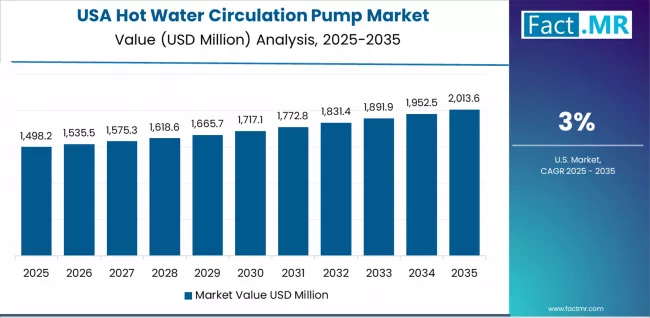
The United States establishes energy efficiency development through comprehensive building programs and established energy infrastructure, integrating hot water circulation pumps across residential buildings and commercial applications. The country's 3.0% growth rate reflects mature heating industry relationships and established circulation adoption that supports widespread use of circulation systems in residential and commercial facilities. Growth concentrates in major construction centers, including Texas, California, and Florida, where heating technology showcases mature circulation deployment that appeals to builders seeking proven energy efficiency capabilities and operational optimization applications.
American builders leverage established distribution networks and comprehensive energy efficiency capabilities, including application development programs and technical support that create customer relationships and operational advantages. The market benefits from mature energy standards and building requirements that mandate circulation system use while supporting technology advancement and operational optimization.
Japan Demonstrates Precision Quality Focus
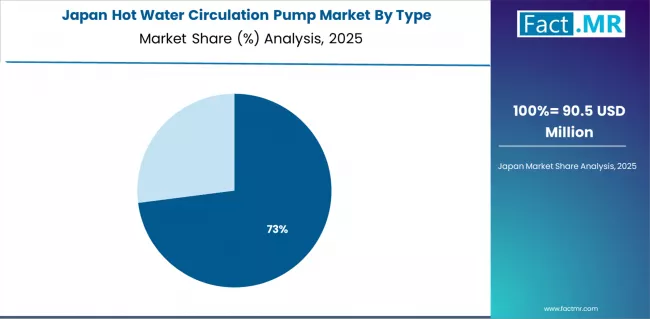
Japan's advanced heating technology market demonstrates sophisticated hot water circulation pump deployment with documented operational effectiveness in premium residential applications and modern commercial facilities through integration with existing energy systems and building infrastructure. The country maintains a 2.8% growth rate, leveraging traditional quality expertise and precision systems integration in heating technology. Urban centers, including Tokyo, Osaka, and Nagoya, showcase premium installations where circulation systems integrate with traditional building platforms and modern facility management systems to optimize heating operations and maintain energy quality profiles.
Japanese manufacturers prioritize circulation precision and energy consistency in pump development, creating demand for premium systems with advanced features, including energy monitoring and automated circulation systems. The market benefits from established quality infrastructure and commitment to energy standards that provide long-term operational benefits and compliance with traditional building preparation methods.
Europe Market Split by Country
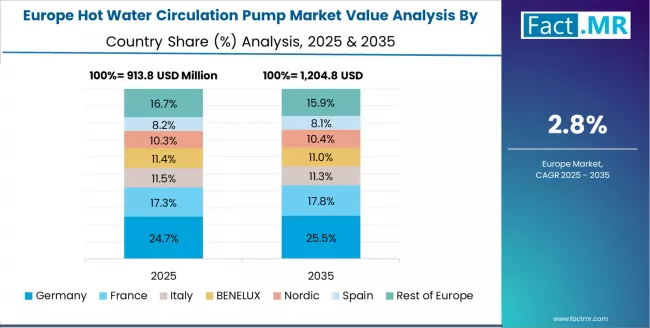
The European hot water circulation pump market is projected to grow from USD 3,600.0 million in 2025, representing significant regional market presence, with strong distribution across major economies. Germany is expected to maintain its leadership position with USD 760.0 million in 2025, accounting for 21.1% of the European market, supported by its advanced heating infrastructure and major building development centers.
The United Kingdom follows with USD 540.0 million, representing 15.0% of the European market in 2025, driven by comprehensive building renovation programs and heating technology development initiatives. France holds USD 440.0 million with 12.2% market share through specialized heating applications and energy compliance requirements. Italy commands USD 360.0 million representing 10.0% share, while Spain accounts for USD 300.0 million or 8.3% in 2025. The rest of Europe region maintains USD 1,200.0 million, representing 33.3% of the European market, attributed to increasing circulation system adoption in Nordic countries and emerging building facilities implementing heating modernization programs.
Competitive Landscape of the Hot Water Circulation Pump Market
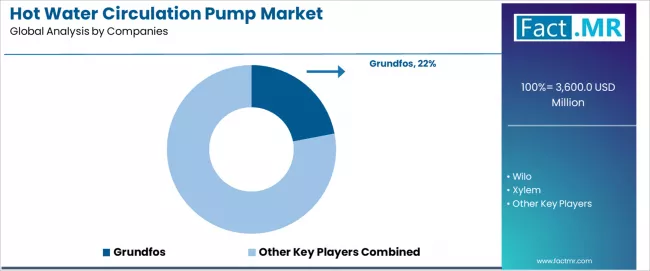
- Structure: ~10-12 credible players; top 3-4 hold ~55-60% by revenue.
- Leadership is maintained through: distribution control, pumping innovation, and application reliability (flow consistency + energy efficiency + application versatility).
- What's commoditizing: basic circulation pumping methods and standard capacity packaging.
- Margin Opportunities: custom heating formulations, technical development, and integration into customer heating systems (maintenance management, energy optimization delivery).
| Stakeholder | What they actually control | Typical strengths | Typical blind spots |
|---|---|---|---|
| Global platforms | Distribution reach, deep product catalogs, pumping facilities | Broad availability, proven reliability, multi-region support | Technology refresh cycles; customer lock-in dependency |
| Technology innovators | R&D capabilities; advanced pumping systems; smart digital interfaces | Latest circulation first; attractive ROI on high-volume production | Service density outside core regions; customization complexity |
| Regional specialists | Local sourcing, fast delivery, nearby technical support | "Close to site" support; pragmatic pricing; local regulations | Technology gaps; talent retention in heating |
| Efficiency-focused ecosystems | Application consistency, technical support, capacity sourcing | Lowest energy variation; comprehensive support | Operational costs if overpromised; technology obsolescence |
| Application specialists | Specialized heating solutions, custom systems, technical development | Win specialized applications; flexible circulation | Scalability limitations; narrow market focus |
Key Players in the Hot Water Circulation Pump Market
- Grundfos
- Wilo
- Xylem
- KSB
- Armstrong Fluid
- Taco Comfort
- Calpeda
- Ebara
- Dab Pumps
- Flowserve
- Pedrollo
- Bell & Gossett
- Lowara
- Pentair
- Kirloskar Brothers
Scope of the Report
| Items | Values |
|---|---|
| Quantitative Units (2025) | USD 3,600.0 million |
| Type | Single-Stage, Multi-Stage |
| End Use | Residential, Commercial, Industrial |
| Drive Type | Electric, Solar |
| Regions Covered | East Asia, Western Europe, South Asia Pacific, North America, Latin America, Middle East & Africa |
| Countries Covered | China, Germany, United States, Japan, India, South Korea, Brazil, France, United Kingdom, and 30+ additional countries |
| Key Companies Profiled | Grundfos, Wilo, Xylem, KSB, Armstrong Fluid, Taco Comfort, Calpeda, Ebara, Dab Pumps, Flowserve, Pedrollo, Bell & Gossett |
| Additional Attributes | Dollar sales by type and end-use categories, regional adoption trends across East Asia, Western Europe, and South Asia Pacific, competitive landscape with circulation manufacturers and heating suppliers, facility preferences for application consistency and pumping reliability, integration with building platforms and energy monitoring systems, innovations in circulation technology and heating enhancement, and development of advanced pumping solutions with enhanced performance and energy optimization capabilities. |
Hot Water Circulation Pump Market by Segments
-
Type :
- Single-Stage
- Multi-Stage
-
End Use :
- Residential
- Commercial
- Industrial
-
Drive Type :
- Electric
- Solar
-
Region :
- East Asia
- China
- Japan
- South Korea
- South Asia Pacific
- India
- ASEAN
- Australia & New Zealand
- Rest of South Asia Pacific
- Western Europe
- Germany
- France
- United Kingdom
- Italy
- Spain
- Rest of Western Europe
- North America
- United States
- Canada
- Mexico
- Latin America
- Brazil
- Rest of Latin America
- Middle East & Africa
- GCC Countries
- South Africa
- Rest of Middle East & Africa
- East Asia
Table of Content
- Executive Summary
- Global Market Outlook
- Demand to side Trends
- Supply to side Trends
- Technology Roadmap Analysis
- Analysis and Recommendations
- Market Overview
- Market Coverage / Taxonomy
- Market Definition / Scope / Limitations
- Market Background
- Market Dynamics
- Drivers
- Restraints
- Opportunity
- Trends
- Scenario Forecast
- Demand in Optimistic Scenario
- Demand in Likely Scenario
- Demand in Conservative Scenario
- Opportunity Map Analysis
- Product Life Cycle Analysis
- Supply Chain Analysis
- Investment Feasibility Matrix
- Value Chain Analysis
- PESTLE and Porter’s Analysis
- Regulatory Landscape
- Regional Parent Market Outlook
- Production and Consumption Statistics
- Import and Export Statistics
- Market Dynamics
- Global Market Analysis 2020 to 2024 and Forecast, 2025 to 2035
- Historical Market Size Value (USD Million) Analysis, 2020 to 2024
- Current and Future Market Size Value (USD Million) Projections, 2025 to 2035
- Y to o to Y Growth Trend Analysis
- Absolute $ Opportunity Analysis
- Global Market Pricing Analysis 2020 to 2024 and Forecast 2025 to 2035
- Global Market Analysis 2020 to 2024 and Forecast 2025 to 2035, By Type
- Introduction / Key Findings
- Historical Market Size Value (USD Million) Analysis By Type , 2020 to 2024
- Current and Future Market Size Value (USD Million) Analysis and Forecast By Type , 2025 to 2035
- Single-Stage
- Multi-Stage
- Y to o to Y Growth Trend Analysis By Type , 2020 to 2024
- Absolute $ Opportunity Analysis By Type , 2025 to 2035
- Global Market Analysis 2020 to 2024 and Forecast 2025 to 2035, By End Use
- Introduction / Key Findings
- Historical Market Size Value (USD Million) Analysis By End Use, 2020 to 2024
- Current and Future Market Size Value (USD Million) Analysis and Forecast By End Use, 2025 to 2035
- Residential
- Commercial
- Industrial
- Y to o to Y Growth Trend Analysis By End Use, 2020 to 2024
- Absolute $ Opportunity Analysis By End Use, 2025 to 2035
- Global Market Analysis 2020 to 2024 and Forecast 2025 to 2035, By Drive Type
- Introduction / Key Findings
- Historical Market Size Value (USD Million) Analysis By Drive Type, 2020 to 2024
- Current and Future Market Size Value (USD Million) Analysis and Forecast By Drive Type, 2025 to 2035
- Electric
- Solar
- Y to o to Y Growth Trend Analysis By Drive Type, 2020 to 2024
- Absolute $ Opportunity Analysis By Drive Type, 2025 to 2035
- Global Market Analysis 2020 to 2024 and Forecast 2025 to 2035, By Region
- Introduction
- Historical Market Size Value (USD Million) Analysis By Region, 2020 to 2024
- Current Market Size Value (USD Million) Analysis and Forecast By Region, 2025 to 2035
- North America
- Latin America
- Western Europe
- Eastern Europe
- East Asia
- South Asia and Pacific
- Middle East & Africa
- Market Attractiveness Analysis By Region
- North America Market Analysis 2020 to 2024 and Forecast 2025 to 2035, By Country
- Historical Market Size Value (USD Million) Trend Analysis By Market Taxonomy, 2020 to 2024
- Market Size Value (USD Million) Forecast By Market Taxonomy, 2025 to 2035
- By Country
- USA
- Canada
- Mexico
- By Type
- By End Use
- By Drive Type
- By Country
- Market Attractiveness Analysis
- By Country
- By Type
- By End Use
- By Drive Type
- Key Takeaways
- Latin America Market Analysis 2020 to 2024 and Forecast 2025 to 2035, By Country
- Historical Market Size Value (USD Million) Trend Analysis By Market Taxonomy, 2020 to 2024
- Market Size Value (USD Million) Forecast By Market Taxonomy, 2025 to 2035
- By Country
- Brazil
- Chile
- Rest of Latin America
- By Type
- By End Use
- By Drive Type
- By Country
- Market Attractiveness Analysis
- By Country
- By Type
- By End Use
- By Drive Type
- Key Takeaways
- Western Europe Market Analysis 2020 to 2024 and Forecast 2025 to 2035, By Country
- Historical Market Size Value (USD Million) Trend Analysis By Market Taxonomy, 2020 to 2024
- Market Size Value (USD Million) Forecast By Market Taxonomy, 2025 to 2035
- By Country
- Germany
- UK
- Italy
- Spain
- France
- Nordic
- BENELUX
- Rest of Western Europe
- By Type
- By End Use
- By Drive Type
- By Country
- Market Attractiveness Analysis
- By Country
- By Type
- By End Use
- By Drive Type
- Key Takeaways
- Eastern Europe Market Analysis 2020 to 2024 and Forecast 2025 to 2035, By Country
- Historical Market Size Value (USD Million) Trend Analysis By Market Taxonomy, 2020 to 2024
- Market Size Value (USD Million) Forecast By Market Taxonomy, 2025 to 2035
- By Country
- Russia
- Poland
- Hungary
- Balkan & Baltic
- Rest of Eastern Europe
- By Type
- By End Use
- By Drive Type
- By Country
- Market Attractiveness Analysis
- By Country
- By Type
- By End Use
- By Drive Type
- Key Takeaways
- East Asia Market Analysis 2020 to 2024 and Forecast 2025 to 2035, By Country
- Historical Market Size Value (USD Million) Trend Analysis By Market Taxonomy, 2020 to 2024
- Market Size Value (USD Million) Forecast By Market Taxonomy, 2025 to 2035
- By Country
- China
- Japan
- South Korea
- By Type
- By End Use
- By Drive Type
- By Country
- Market Attractiveness Analysis
- By Country
- By Type
- By End Use
- By Drive Type
- Key Takeaways
- South Asia and Pacific Market Analysis 2020 to 2024 and Forecast 2025 to 2035, By Country
- Historical Market Size Value (USD Million) Trend Analysis By Market Taxonomy, 2020 to 2024
- Market Size Value (USD Million) Forecast By Market Taxonomy, 2025 to 2035
- By Country
- India
- ASEAN
- Australia & New Zealand
- Rest of South Asia and Pacific
- By Type
- By End Use
- By Drive Type
- By Country
- Market Attractiveness Analysis
- By Country
- By Type
- By End Use
- By Drive Type
- Key Takeaways
- Middle East & Africa Market Analysis 2020 to 2024 and Forecast 2025 to 2035, By Country
- Historical Market Size Value (USD Million) Trend Analysis By Market Taxonomy, 2020 to 2024
- Market Size Value (USD Million) Forecast By Market Taxonomy, 2025 to 2035
- By Country
- Kingdom of Saudi Arabia
- Other GCC Countries
- Turkiye
- South Africa
- Other African Union
- Rest of Middle East & Africa
- By Type
- By End Use
- By Drive Type
- By Country
- Market Attractiveness Analysis
- By Country
- By Type
- By End Use
- By Drive Type
- Key Takeaways
- Key Countries Market Analysis
- USA
- Pricing Analysis
- Market Share Analysis, 2024
- By Type
- By End Use
- By Drive Type
- Canada
- Pricing Analysis
- Market Share Analysis, 2024
- By Type
- By End Use
- By Drive Type
- Mexico
- Pricing Analysis
- Market Share Analysis, 2024
- By Type
- By End Use
- By Drive Type
- Brazil
- Pricing Analysis
- Market Share Analysis, 2024
- By Type
- By End Use
- By Drive Type
- Chile
- Pricing Analysis
- Market Share Analysis, 2024
- By Type
- By End Use
- By Drive Type
- Germany
- Pricing Analysis
- Market Share Analysis, 2024
- By Type
- By End Use
- By Drive Type
- UK
- Pricing Analysis
- Market Share Analysis, 2024
- By Type
- By End Use
- By Drive Type
- Italy
- Pricing Analysis
- Market Share Analysis, 2024
- By Type
- By End Use
- By Drive Type
- Spain
- Pricing Analysis
- Market Share Analysis, 2024
- By Type
- By End Use
- By Drive Type
- France
- Pricing Analysis
- Market Share Analysis, 2024
- By Type
- By End Use
- By Drive Type
- India
- Pricing Analysis
- Market Share Analysis, 2024
- By Type
- By End Use
- By Drive Type
- ASEAN
- Pricing Analysis
- Market Share Analysis, 2024
- By Type
- By End Use
- By Drive Type
- Australia & New Zealand
- Pricing Analysis
- Market Share Analysis, 2024
- By Type
- By End Use
- By Drive Type
- China
- Pricing Analysis
- Market Share Analysis, 2024
- By Type
- By End Use
- By Drive Type
- Japan
- Pricing Analysis
- Market Share Analysis, 2024
- By Type
- By End Use
- By Drive Type
- South Korea
- Pricing Analysis
- Market Share Analysis, 2024
- By Type
- By End Use
- By Drive Type
- Russia
- Pricing Analysis
- Market Share Analysis, 2024
- By Type
- By End Use
- By Drive Type
- Poland
- Pricing Analysis
- Market Share Analysis, 2024
- By Type
- By End Use
- By Drive Type
- Hungary
- Pricing Analysis
- Market Share Analysis, 2024
- By Type
- By End Use
- By Drive Type
- Kingdom of Saudi Arabia
- Pricing Analysis
- Market Share Analysis, 2024
- By Type
- By End Use
- By Drive Type
- Turkiye
- Pricing Analysis
- Market Share Analysis, 2024
- By Type
- By End Use
- By Drive Type
- South Africa
- Pricing Analysis
- Market Share Analysis, 2024
- By Type
- By End Use
- By Drive Type
- USA
- Market Structure Analysis
- Competition Dashboard
- Competition Benchmarking
- Market Share Analysis of Top Players
- By Regional
- By Type
- By End Use
- By Drive Type
- Competition Analysis
- Competition Deep Dive
- Grundfos
- Overview
- Product Portfolio
- Profitability by Market Segments (Product/Age /Sales Channel/Region)
- Sales Footprint
- Strategy Overview
- Marketing Strategy
- Product Strategy
- Channel Strategy
- Wilo
- Xylem
- KSB
- Armstrong Fluid
- Taco Comfort
- Calpeda
- Ebara
- Dab Pumps
- Flowserve
- Pedrollo
- Bell & Gossett
- Lowara
- Pentair
- Kirloskar Brothers
- Grundfos
- Competition Deep Dive
- Assumptions & Acronyms Used
- Research Methodology
List Of Table
- Table 1: Global Market Value (USD Million) Forecast by Region, 2020 to 2035
- Table 2: Global Market Value (USD Million) Forecast by Type , 2020 to 2035
- Table 3: Global Market Value (USD Million) Forecast by End Use, 2020 to 2035
- Table 4: Global Market Value (USD Million) Forecast by Drive Type, 2020 to 2035
- Table 5: North America Market Value (USD Million) Forecast by Country, 2020 to 2035
- Table 6: North America Market Value (USD Million) Forecast by Type , 2020 to 2035
- Table 7: North America Market Value (USD Million) Forecast by End Use, 2020 to 2035
- Table 8: North America Market Value (USD Million) Forecast by Drive Type, 2020 to 2035
- Table 9: Latin America Market Value (USD Million) Forecast by Country, 2020 to 2035
- Table 10: Latin America Market Value (USD Million) Forecast by Type , 2020 to 2035
- Table 11: Latin America Market Value (USD Million) Forecast by End Use, 2020 to 2035
- Table 12: Latin America Market Value (USD Million) Forecast by Drive Type, 2020 to 2035
- Table 13: Western Europe Market Value (USD Million) Forecast by Country, 2020 to 2035
- Table 14: Western Europe Market Value (USD Million) Forecast by Type , 2020 to 2035
- Table 15: Western Europe Market Value (USD Million) Forecast by End Use, 2020 to 2035
- Table 16: Western Europe Market Value (USD Million) Forecast by Drive Type, 2020 to 2035
- Table 17: Eastern Europe Market Value (USD Million) Forecast by Country, 2020 to 2035
- Table 18: Eastern Europe Market Value (USD Million) Forecast by Type , 2020 to 2035
- Table 19: Eastern Europe Market Value (USD Million) Forecast by End Use, 2020 to 2035
- Table 20: Eastern Europe Market Value (USD Million) Forecast by Drive Type, 2020 to 2035
- Table 21: East Asia Market Value (USD Million) Forecast by Country, 2020 to 2035
- Table 22: East Asia Market Value (USD Million) Forecast by Type , 2020 to 2035
- Table 23: East Asia Market Value (USD Million) Forecast by End Use, 2020 to 2035
- Table 24: East Asia Market Value (USD Million) Forecast by Drive Type, 2020 to 2035
- Table 25: South Asia and Pacific Market Value (USD Million) Forecast by Country, 2020 to 2035
- Table 26: South Asia and Pacific Market Value (USD Million) Forecast by Type , 2020 to 2035
- Table 27: South Asia and Pacific Market Value (USD Million) Forecast by End Use, 2020 to 2035
- Table 28: South Asia and Pacific Market Value (USD Million) Forecast by Drive Type, 2020 to 2035
- Table 29: Middle East & Africa Market Value (USD Million) Forecast by Country, 2020 to 2035
- Table 30: Middle East & Africa Market Value (USD Million) Forecast by Type , 2020 to 2035
- Table 31: Middle East & Africa Market Value (USD Million) Forecast by End Use, 2020 to 2035
- Table 32: Middle East & Africa Market Value (USD Million) Forecast by Drive Type, 2020 to 2035
List Of Figures
- Figure 1: Global Market Pricing Analysis
- Figure 2: Global Market Value (USD Million) Forecast 2020-2035
- Figure 3: Global Market Value Share and BPS Analysis by Type , 2025 and 2035
- Figure 4: Global Market Y to o to Y Growth Comparison by Type , 2025-2035
- Figure 5: Global Market Attractiveness Analysis by Type
- Figure 6: Global Market Value Share and BPS Analysis by End Use, 2025 and 2035
- Figure 7: Global Market Y to o to Y Growth Comparison by End Use, 2025-2035
- Figure 8: Global Market Attractiveness Analysis by End Use
- Figure 9: Global Market Value Share and BPS Analysis by Drive Type, 2025 and 2035
- Figure 10: Global Market Y to o to Y Growth Comparison by Drive Type, 2025-2035
- Figure 11: Global Market Attractiveness Analysis by Drive Type
- Figure 12: Global Market Value (USD Million) Share and BPS Analysis by Region, 2025 and 2035
- Figure 13: Global Market Y to o to Y Growth Comparison by Region, 2025-2035
- Figure 14: Global Market Attractiveness Analysis by Region
- Figure 15: North America Market Incremental Dollar Opportunity, 2025-2035
- Figure 16: Latin America Market Incremental Dollar Opportunity, 2025-2035
- Figure 17: Western Europe Market Incremental Dollar Opportunity, 2025-2035
- Figure 18: Eastern Europe Market Incremental Dollar Opportunity, 2025-2035
- Figure 19: East Asia Market Incremental Dollar Opportunity, 2025-2035
- Figure 20: South Asia and Pacific Market Incremental Dollar Opportunity, 2025-2035
- Figure 21: Middle East & Africa Market Incremental Dollar Opportunity, 2025-2035
- Figure 22: North America Market Value Share and BPS Analysis by Country, 2025 and 2035
- Figure 23: North America Market Value Share and BPS Analysis by Type , 2025 and 2035
- Figure 24: North America Market Y to o to Y Growth Comparison by Type , 2025-2035
- Figure 25: North America Market Attractiveness Analysis by Type
- Figure 26: North America Market Value Share and BPS Analysis by End Use, 2025 and 2035
- Figure 27: North America Market Y to o to Y Growth Comparison by End Use, 2025-2035
- Figure 28: North America Market Attractiveness Analysis by End Use
- Figure 29: North America Market Value Share and BPS Analysis by Drive Type, 2025 and 2035
- Figure 30: North America Market Y to o to Y Growth Comparison by Drive Type, 2025-2035
- Figure 31: North America Market Attractiveness Analysis by Drive Type
- Figure 32: Latin America Market Value Share and BPS Analysis by Country, 2025 and 2035
- Figure 33: Latin America Market Value Share and BPS Analysis by Type , 2025 and 2035
- Figure 34: Latin America Market Y to o to Y Growth Comparison by Type , 2025-2035
- Figure 35: Latin America Market Attractiveness Analysis by Type
- Figure 36: Latin America Market Value Share and BPS Analysis by End Use, 2025 and 2035
- Figure 37: Latin America Market Y to o to Y Growth Comparison by End Use, 2025-2035
- Figure 38: Latin America Market Attractiveness Analysis by End Use
- Figure 39: Latin America Market Value Share and BPS Analysis by Drive Type, 2025 and 2035
- Figure 40: Latin America Market Y to o to Y Growth Comparison by Drive Type, 2025-2035
- Figure 41: Latin America Market Attractiveness Analysis by Drive Type
- Figure 42: Western Europe Market Value Share and BPS Analysis by Country, 2025 and 2035
- Figure 43: Western Europe Market Value Share and BPS Analysis by Type , 2025 and 2035
- Figure 44: Western Europe Market Y to o to Y Growth Comparison by Type , 2025-2035
- Figure 45: Western Europe Market Attractiveness Analysis by Type
- Figure 46: Western Europe Market Value Share and BPS Analysis by End Use, 2025 and 2035
- Figure 47: Western Europe Market Y to o to Y Growth Comparison by End Use, 2025-2035
- Figure 48: Western Europe Market Attractiveness Analysis by End Use
- Figure 49: Western Europe Market Value Share and BPS Analysis by Drive Type, 2025 and 2035
- Figure 50: Western Europe Market Y to o to Y Growth Comparison by Drive Type, 2025-2035
- Figure 51: Western Europe Market Attractiveness Analysis by Drive Type
- Figure 52: Eastern Europe Market Value Share and BPS Analysis by Country, 2025 and 2035
- Figure 53: Eastern Europe Market Value Share and BPS Analysis by Type , 2025 and 2035
- Figure 54: Eastern Europe Market Y to o to Y Growth Comparison by Type , 2025-2035
- Figure 55: Eastern Europe Market Attractiveness Analysis by Type
- Figure 56: Eastern Europe Market Value Share and BPS Analysis by End Use, 2025 and 2035
- Figure 57: Eastern Europe Market Y to o to Y Growth Comparison by End Use, 2025-2035
- Figure 58: Eastern Europe Market Attractiveness Analysis by End Use
- Figure 59: Eastern Europe Market Value Share and BPS Analysis by Drive Type, 2025 and 2035
- Figure 60: Eastern Europe Market Y to o to Y Growth Comparison by Drive Type, 2025-2035
- Figure 61: Eastern Europe Market Attractiveness Analysis by Drive Type
- Figure 62: East Asia Market Value Share and BPS Analysis by Country, 2025 and 2035
- Figure 63: East Asia Market Value Share and BPS Analysis by Type , 2025 and 2035
- Figure 64: East Asia Market Y to o to Y Growth Comparison by Type , 2025-2035
- Figure 65: East Asia Market Attractiveness Analysis by Type
- Figure 66: East Asia Market Value Share and BPS Analysis by End Use, 2025 and 2035
- Figure 67: East Asia Market Y to o to Y Growth Comparison by End Use, 2025-2035
- Figure 68: East Asia Market Attractiveness Analysis by End Use
- Figure 69: East Asia Market Value Share and BPS Analysis by Drive Type, 2025 and 2035
- Figure 70: East Asia Market Y to o to Y Growth Comparison by Drive Type, 2025-2035
- Figure 71: East Asia Market Attractiveness Analysis by Drive Type
- Figure 72: South Asia and Pacific Market Value Share and BPS Analysis by Country, 2025 and 2035
- Figure 73: South Asia and Pacific Market Value Share and BPS Analysis by Type , 2025 and 2035
- Figure 74: South Asia and Pacific Market Y to o to Y Growth Comparison by Type , 2025-2035
- Figure 75: South Asia and Pacific Market Attractiveness Analysis by Type
- Figure 76: South Asia and Pacific Market Value Share and BPS Analysis by End Use, 2025 and 2035
- Figure 77: South Asia and Pacific Market Y to o to Y Growth Comparison by End Use, 2025-2035
- Figure 78: South Asia and Pacific Market Attractiveness Analysis by End Use
- Figure 79: South Asia and Pacific Market Value Share and BPS Analysis by Drive Type, 2025 and 2035
- Figure 80: South Asia and Pacific Market Y to o to Y Growth Comparison by Drive Type, 2025-2035
- Figure 81: South Asia and Pacific Market Attractiveness Analysis by Drive Type
- Figure 82: Middle East & Africa Market Value Share and BPS Analysis by Country, 2025 and 2035
- Figure 83: Middle East & Africa Market Value Share and BPS Analysis by Type , 2025 and 2035
- Figure 84: Middle East & Africa Market Y to o to Y Growth Comparison by Type , 2025-2035
- Figure 85: Middle East & Africa Market Attractiveness Analysis by Type
- Figure 86: Middle East & Africa Market Value Share and BPS Analysis by End Use, 2025 and 2035
- Figure 87: Middle East & Africa Market Y to o to Y Growth Comparison by End Use, 2025-2035
- Figure 88: Middle East & Africa Market Attractiveness Analysis by End Use
- Figure 89: Middle East & Africa Market Value Share and BPS Analysis by Drive Type, 2025 and 2035
- Figure 90: Middle East & Africa Market Y to o to Y Growth Comparison by Drive Type, 2025-2035
- Figure 91: Middle East & Africa Market Attractiveness Analysis by Drive Type
- Figure 92: Global Market - Tier Structure Analysis
- Figure 93: Global Market - Company Share Analysis
- FAQs -
How big is the hot water circulation pump market in 2025?
The global hot water circulation pump market is estimated to be valued at USD 3,600.0 million in 2025.
What will be the size of hot water circulation pump market in 2035?
The market size for the hot water circulation pump market is projected to reach USD 4,980.9 million by 2035.
How much will be the hot water circulation pump market growth between 2025 and 2035?
The hot water circulation pump market is expected to grow at a 3.3% CAGR between 2025 and 2035.
What are the key product types in the hot water circulation pump market?
The key product types in hot water circulation pump market are single-stage and multi-stage.
Which end use segment to contribute significant share in the hot water circulation pump market in 2025?
In terms of end use, residential segment to command 50.0% share in the hot water circulation pump market in 2025.